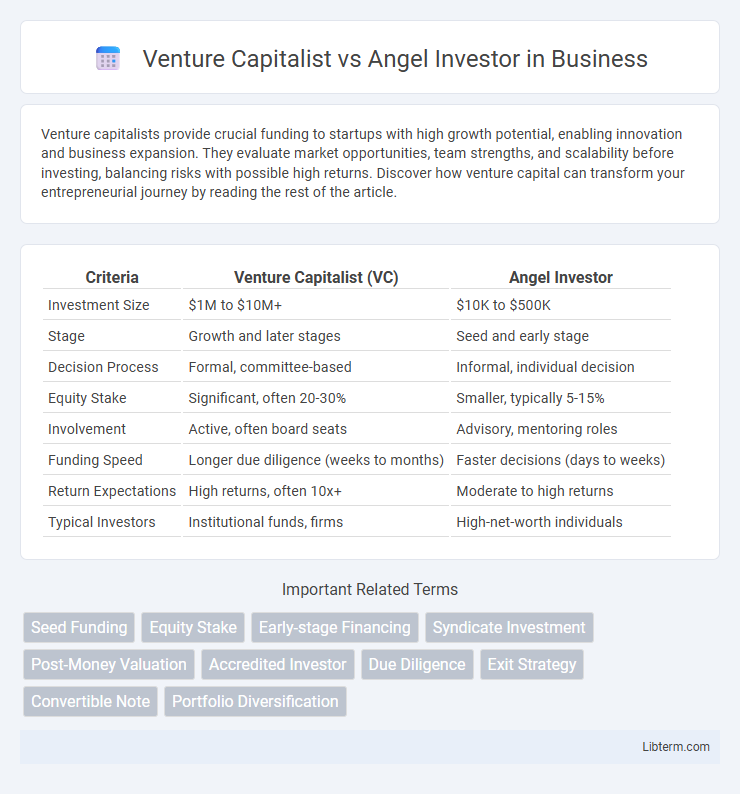Venture capitalists provide crucial funding to startups with high growth potential, enabling innovation and business expansion. They evaluate market opportunities, team strengths, and scalability before investing, balancing risks with possible high returns. Discover how venture capital can transform your entrepreneurial journey by reading the rest of the article.
Table of Comparison
| Criteria | Venture Capitalist (VC) | Angel Investor |
|---|---|---|
| Investment Size | $1M to $10M+ | $10K to $500K |
| Stage | Growth and later stages | Seed and early stage |
| Decision Process | Formal, committee-based | Informal, individual decision |
| Equity Stake | Significant, often 20-30% | Smaller, typically 5-15% |
| Involvement | Active, often board seats | Advisory, mentoring roles |
| Funding Speed | Longer due diligence (weeks to months) | Faster decisions (days to weeks) |
| Return Expectations | High returns, often 10x+ | Moderate to high returns |
| Typical Investors | Institutional funds, firms | High-net-worth individuals |
Understanding Venture Capitalists and Angel Investors
Venture capitalists are professional investors managing pooled funds from institutions and high-net-worth individuals, focusing on high-growth startups with substantial capital requirements and expecting significant equity stakes. Angel investors are affluent individuals investing their own money in early-stage startups, often providing smaller amounts of capital and value-added support like mentorship and networks. Understanding the distinct investment goals, risk tolerance, and involvement levels of venture capitalists versus angel investors is crucial for entrepreneurs seeking tailored financing solutions.
Key Differences Between Venture Capitalists and Angel Investors
Venture capitalists typically manage pooled funds from institutional investors and invest larger amounts in startups with high growth potential, often seeking significant equity and board control. Angel investors use their personal wealth to provide early-stage funding, usually contributing smaller sums and offering mentorship with less involvement in company governance. The distinct investment size, funding source, involvement level, and risk tolerance are key factors differentiating venture capitalists from angel investors.
Investment Size: How Much Do They Invest?
Venture capitalists typically invest larger sums, ranging from $1 million to over $10 million, focusing on high-growth startups poised for rapid scaling. Angel investors usually provide smaller amounts, between $25,000 and $500,000, often participating in early seed rounds or pre-seed funding. Investment size differences reflect their distinct roles in startup financing, with angels supporting initial development and venture capitalists driving expansion.
Funding Stages: When Do They Get Involved?
Venture capitalists typically invest during later funding stages such as Series A, B, or C rounds when startups have demonstrated growth potential and seek significant capital for scaling. Angel investors usually enter the funding process earlier, often during the seed or pre-seed stages, providing initial capital and mentorship to help startups refine their business models. Understanding the timing differences in funding involvement between venture capitalists and angel investors is crucial for entrepreneurs seeking the right type of financial support.
Source of Capital: Where Does the Money Come From?
Venture capitalists typically manage pooled funds from institutional investors, pension funds, and high-net-worth individuals, using these resources to invest in startups with high growth potential. Angel investors, in contrast, invest their personal wealth directly into early-stage companies, often providing seed capital based on individual judgment and industry experience. The source of capital significantly influences investment size, risk tolerance, and involvement in the startup's development.
Involvement Level in the Startup
Venture capitalists typically engage deeply in a startup's strategic decisions, often securing board seats to influence growth trajectories and safeguard their investments. Angel investors usually maintain a hands-off approach, providing financial support with limited oversight or direct involvement in daily operations. The level of involvement by venture capitalists tends to be more structured and intensive compared to the generally advisory role of angel investors.
Risk Appetite and Investment Strategy
Venture capitalists typically exhibit a moderate to high risk appetite, investing larger sums in startups with scalable business models and proven traction, aiming for significant equity stakes and structured exits. Angel investors often embrace higher risk tolerance by funding earlier-stage ventures or innovative ideas with little to no revenue, providing mentorship alongside smaller capital injections. Both prioritize portfolio diversification but differ in investment horizons, with venture capitalists seeking quicker returns through follow-on funding rounds and angel investors favoring longer-term growth potential.
Pros and Cons for Entrepreneurs
Venture capitalists provide substantial funding and industry connections, accelerating business growth but often demand significant equity and control, potentially limiting entrepreneurial freedom. Angel investors offer more flexible terms and mentorship, making early-stage funding accessible, yet their financial capacity may be limited compared to venture capital firms. Entrepreneurs must weigh the trade-offs between scale of investment, control retention, and strategic support when choosing between these funding sources.
Choosing Between a Venture Capitalist and an Angel Investor
Choosing between a venture capitalist and an angel investor depends on the startup's growth stage and funding needs, as venture capitalists typically provide larger investments and expect significant equity stakes in exchange for aggressive scaling potential. Angel investors, often experienced entrepreneurs themselves, usually invest smaller amounts early in a company's life cycle and may offer more flexible terms with valuable mentorship. Evaluating the company's long-term strategic goals and the level of involvement desired from investors is crucial when deciding between these financing sources.
Trends in Venture Capital and Angel Investing
Venture capitalists increasingly target scalable technology startups with multi-million-dollar funding rounds, emphasizing data-driven growth and market disruption. Angel investors continue to focus on early-stage ventures, often leveraging personal networks to provide seed capital and mentorship. Emerging trends highlight a growing collaboration between venture capitalists and angel investors to co-fund innovative ventures, accelerating startup success and ecosystem synergy.
Venture Capitalist Infographic

 libterm.com
libterm.com